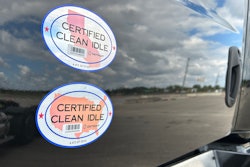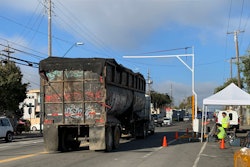U.S. Environmental Protection Agency (EPA) Administrator Lee Zeldin has wasted little time making good on his promise to prioritize efforts to "roll back regulations." His office announced Wednesday it would reconsider the Greenhouse Gas Emissions Standards for Heavy-Duty Vehicles – Phase 3 (GHG3) final rule, and revisit portions of the Biden-era "Clean Trucks Plan," which includes the 2022 Heavy-Duty Nitrous Oxide (NOx) rule.
The new regulations came with a more than $700 billion price tag in regulatory and compliance costs and provided the foundation for the Biden-Harris electric vehicle mandate.
“Today is the greatest day of deregulation our nation has seen," Zeldin said following the announcement Wednesday that his office had taken 31 actions to advance President Trump’s Day One executive orders and Power the Great American Comeback. "We are driving a dagger straight into the heart of the climate change religion to drive down cost of living for American families, unleash American energy, bring auto jobs back to the U.S. and more."
The path to repealing or changing the regulations is a long one, requiring a lengthly rulemaking process and public comment period. If these regulations are repealed or significantly relaxed, it could throw cold water on a pre-2027 new truck pre-buy that was forecast to start in the coming quarters.
Trucking industry responds
Engineering has long been underway on diesel engines that will meet these now-under-fire 2027 emissions regulations. Many aftertreatment systems have been completely redesigned, electrical systems and engines re-engineered, and an entirely new diesel engine oil category has been implemented to reach compliance.
Several truck and engine OEMs told CCJ anonymously that EPA '27 compliant engines are going to be brought to market for model year 2027 with or without federal mandates. EPA's 2027 Low-NOx Rule, which is also being scrutinized, mandated redefining the "useful life" of regulated trucks from 435,000 miles to up to 650,000 miles, and it increased emissions systems warranties from 100,000 miles to up to 450,000 miles for model year 2027 trucks. The OEMs agreed that having those warranties remain at their current levels rather than increasing them under the new rule would help keep fleets' costs down on the new engines.
Tuesday at the 2025 Technology & Maintenance Council Annual Meeting & Transportation Technology Exhibition in Nashville, a panel of experts noted emissions regulations have become a bit of a mess and difficult to manage on a state-by-state basis, and the rules have already affected some fleets' ability to purchase new trucks – diesels and battery electric.
American Trucking Associations (ATA) President and CEO Chris Spear commended President Donald Trump and EPA Administrator Zeldin for "restoring common sense to our nation’s environmental laws and demonstrating bold leadership on this critical issue that affects not only the 8.5 million men and women who work in trucking, but all Americans."
Spear further called GHG3 in its current form "unachievable given the state of battery-electric technology and the sheer lack of charging infrastructure. This rule has been an albatross for the trucking industry, threatening to reduce equipment availability, increase costs for businesses and consumers, and cause major supply chain disruptions," he added.
“It is critically important that the federal government set realistic standards with achievable targets and timelines," Spear said. "Prior to the imposition of GHG3, EPA used a collaborate process that served the agency and the trucking industry well and allowed us to make monumental progress to reduce emissions."
The Truckload Carriers Association (TCA) in a statement Wednesday said EPA's consideration of GHG '27 "underscores the effectiveness of TCA's advocacy and the collective efforts of the Clean Freight Coalition, of which TCA and ATA are founding members.
Clean Freight Coalition Chief Strategy Officer Jim Mullen told CCJ his group would continue to work with EPA "on reasonable solutions to cleaner commercial vehicles going forward. We will continue to advocate for a regulatory framework that is technology neutral and achieves the greatest benefit for the environment without unnecessarily burdening the industry, the economy and all consumers of goods in our country."
The EPA Phase 3 rule did not specify any particular emissions solution in its rules, however, it will be difficult to hit emissions benchmarks without some integration of either hybrid, battery-electric, or hydrogen-electric trucks.
"TCA remains committed to actively engaging in this process to ensure that emissions regulations strike a balance between environmental progress and the trucking industry's operational realities," the group said. "By championing practical, achievable solutions, TCA and its members seek to support a transition that benefits both the industry and the environment."
Todd Spencer, president of the Owner-Operator Independent Drivers Association (OOIDA), noted that small-business truckers make up 96% of trucking "and could be regulated out of existence if the current standards were to be implemented. Mom and pop trucking businesses would be suffocated by the sheer cost and operational challenges of effectively mandating zero emission trucks," and commended Zeldin on his "realistic approach to emissions regulations."
Emissions under fire
GHG Phase 3 is just the latest Biden-era emissions regulation to be scrutinized by a Trump administration that had pledged to prioritize deregulation.
Zeldin last month ordered a review of waivers granted by the Biden administration to California for its Advanced Clean Trucks (ACT) and Omnibus NOx rules, which allowed California to preempt federal car and truck standards promulgated by EPA and the U.S. Department of Transportation’s National Highway Traffic Safety Administration.
Zeldin's office noted the Biden administration failed to send rules on California’s waivers to Congress, preventing members of Congress from deciding on "extremely consequential actions that have massive impacts and costs across the entire United States."
In January, CARB California withdrew its remaining outstanding request for waivers to implement its Advanced Clean Fleets (ACF).











